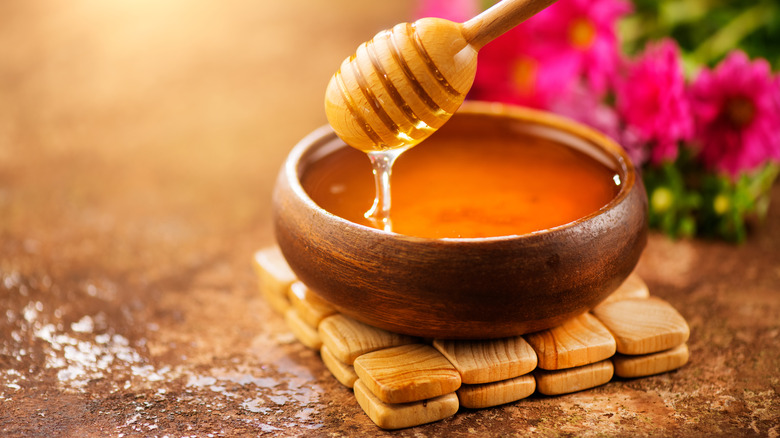Why The Honey In Your Pantry Might Not Be What You Think It Is
Food fraud is an unsettling concept. We like to think that the ingredients listed on our favorite foods are reflective of what's in them, but that's not always the case. Whether it's milk, coffee, seafood, or honey, food fraud is a prevalent issue that can work its way into our homes and affect our bodies.
According to R-biopharm, milk fraud is an extensive problem. These issues can occur both intentionally and unintentionally, and it specifically affects products with goat's and sheep's milk. Both of these milks are very expensive and "adulteration with the much cheaper cow's milk can be lucrative." It is nearly impossible for the average consumer to recognize the swap, making it more difficult to combat.
Similarly, fish fraud often involves expensive fish being swapped out for cheaper options. Oceana, a non-profit organization that advocates for marine conservation, has conducted several studies related to fish fraud and they are quite stark. For example, many expensive fish, like salmon and tuna, are usually not what you're getting when you order your favorite sushi roll. According to Delish, white tuna is frequently swapped out with the escolar fish, which is also known as the"Ex-Lax Fish," due to it often causing intestinal problems in consumers.
And, when it comes to honey, it may be a number-one contender for the most frequently faked or altered food.
Is your honey actually corn syrup?
According to a new report by the United States Department of Agriculture (USDA), U.S. honey consumption "reached a new record high while production was the lowest since 1991." They mainly attribute this low production to lower yields per colony. This imbalance in the supply chain has caused imports of honey to surge, and — if it is able to bypass tests upon entry — fraudulent honey can make its way onto our grocery store shelves (via the Economist).
According to the Economist, honey is the third-most adulterated food behind milk and olive oil, likely because supply chain issues have given some honey-sellers an incentive to dilute their products with cheaper substances such as corn, rice, and beet syrup.
Another problem is that because domestic suppliers are unable to keep up with demand, about half of America's honey comes from Asia. As the Economist explained, "high tariffs are imposed on Chinese honey, disguised versions of which drizzle into America via China's [neighbors]." In addition, many of the tests used to screen honey are outdated and some of the FDA's guidelines to declare ingredients in honey are not legally enforceable (via Insider).
It is important to continue to support beekeepers at this time, as bees are an integral part of our food chain that are facing rapid population declines (via Fair Planet). For future purchases, ordering from small-scale bee farms is a great way to ensure you're getting to enjoy top-quality, bee-utiful honey (via Side Chef).

